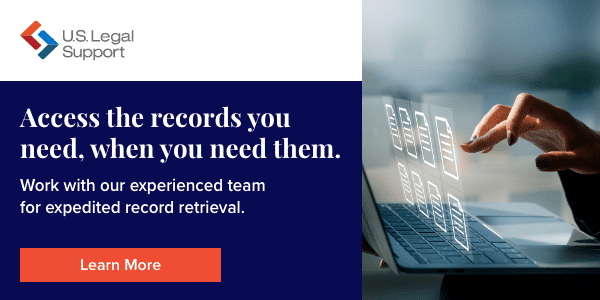The Role of AI & Technology in Record Retrieval

Artificial intelligence (AI) has made waves in just about every industry after breaking containment in 2022. The benefits of automation, powerful data processing, and predictive generation empower a wide variety of efficiencies and even new capacities that professionals weren’t able to cover until AI came around.
The legal profession is no exception; per a recent study, nearly 80% of all lawyers are using AI in one way or another in their practices, irrespective of what their specialties or niches are.1
One process for which AI tools are particularly apt is record retrieval. Below, we’ll provide some context for how records retrieval has evolved alongside modern technology. Then, we’ll explain how AI is pushing it into a new era of efficiency, the benefits this brings, and how to take advantage.
The Evolution of Record Retrieval in the Legal Industry
The legal profession is notoriously slow to change, driven by lawyers’ and firms’ personal and professional preferences for consistency—not to mention many professionals’ well-founded skepticism of cyclical fads. However, many sound legal strategists feel that overcoming resistance to change rather than prioritizing precedents is the key to advancing the field.2
Individual services and processes, including but not limited to record retrieval, are leading the charge in embracing new technologies. Utilizing technological platforms and innovations like cloud storage and now AI allows firms to deliver better results faster and more consistently to clients.
In fact, adopting new technologies has enabled the biggest change in the history of records retrieval: the shift from heavy paper reliance to paperless processing.
How AI is Enhancing Record Retrieval Efficiency
On one level, AI in law powers automation across multiple processes involved in record retrieval, from requests through delivery. AI tools can be used to facilitate and even generate requests automatically, follow up with recipients, and alert legal teams if further inputs are needed. The same principles apply to data extraction and even higher-order processes like categorization.
On another level, AI also powers better accuracy in record retrieval. Machine learning (ML) and natural language processing technology can be trained to monitor for and flag any errors or inconsistencies across documents. With the right configuration, errors can be reported to stakeholders who can correct them. Mistakes or unexpected features that can’t be fixed will be brought to legal teams’ attention immediately, preventing strategizing on false pretenses.
Benefits of AI-Powered Record Retrieval for Law Firms
Together, automation and accuracy assurance streamline the record retrieval process. By reducing human input, legal professionals can devote more of their attention to pressing matters that require human intelligence, interfaces, and oversight.
Practical benefits of AI-powered record retrieval mirror the ways it impacts the process:
- Speed – Rapid, reliable document access has the potential to speed up all other elements of case preparation. Legal teams will have information sooner than usual and may even reduce record retrieval costs.
- Accuracy – Reducing errors and inconsistencies in records leads to greater fidelity and assurance in all other elements of litigation, including any strategic summaries.
Implementing AI-driven record retrieval supercharges all elements of litigation that records touch. Having high-quality records more readily accessible helps legal teams operate better.
How to Integrate AI-Driven Record Retrieval Efficiently
Implementing AI tools in record retrieval can be as simple as developing a robust program or partnering with a service provider that leverages the technology. But, for best effect, law firms should take a more holistic and measured approach to integrating these new tools and services into their overall legal processes.
This starts with assessing current record retrieval processes and identifying specific inefficiencies and bottlenecks that AI tools could solve.
Once a thorough audit has been conducted, firms should target tools that meet their exact needs and means, comparing providers to ensure that the records retrieval solution they land on is a perfect fit. Things to look for include integration with existing legacy platforms, data security and privacy guarantees, and, of course, baseline performance metrics (i.e., speed).
As an added touch, firms should seek out providers that prioritize quality customer service and support to ensure that legal professionals understand how to get the most out of their tools.
Implement AI-Driven Record Retrieval Today
Artificial intelligence is the latest in a long line of technological advancements impacting both individual legal processes and firms’ operations as a whole. Record retrieval can be done much faster and more effectively when leveraging AI tools, which in turn makes law firms operate more swiftly in any legal matter that requires record retrieval. In addition, better efficiency in these matters has a knock-on effect of better overall legal operations.
U.S. Legal Support provides powerful, flexible record retrieval services powered by both advanced AI tools and our expertise in legal administration. Our team will help your firm get the files you need swiftly and securely so you can utilize them to the best of your ability.
To learn more about how we can help, get in touch today!
Sources:
- 2Civility. How Lawyers Can Overcome Fear and Embrace AI in 2025. https://www.2civility.org/how-lawyers-can-overcome-fear-and-embrace-ai-in-2025/
- Thomson Reuters. Overcoming lawyers’ resistance to change. https://legal.thomsonreuters.com/en/insights/articles/overcoming-lawyers-resistance-to-change

Editoral Policy
Content published on the U.S. Legal Support blog is reviewed by professionals in the legal and litigation support services field to help ensure accurate information. The information provided in this blog is for informational purposes only and should not be construed as legal advice for attorneys or clients.


